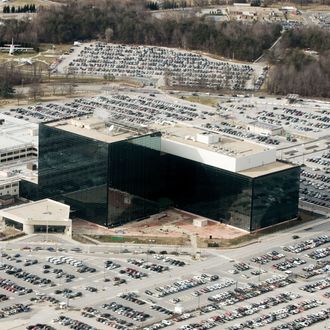
Shortly after the September 11 attacks, the National Security Agency began logging and analyzing Americans’ domestic phone calls and texts. Twelve years later, the American people found out.
The George W. Bush administration’s decision to green-light bulk collection — without asking the (supposedly self-governing) public for permission, or even disclosing the policy’s existence — was justified on grounds of national security. If the government had declined to collect such data, it would have put American lives in danger by frustrating its capacity to foil terrorist plots. And if the White House announced the program’s existence, terrorists would be better able to disguise their communications from the NSA.
And yet, after Edward Snowden exposed the program’s existence in 2013, we learned that the policy had never actually been used to thwart a single terrorist attack. The ensuing controversy led the Obama administration to endorse modest reforms to the program. Instead of allowing the NSA to bulk-collect Americans phone records, the USA Freedom Act of 2015 outsourced such data storage to private phone companies. If the NSA wished to access the records of a particular suspect — along with those of everyone who had ever been in contact with said suspect — the agency would need to secure a judge’s permission, and then retrieve the data from its private-sector partners. Privacy advocates were not satisfied. But preserving the NSA’s access to such data was vital to national security.
Or so the NSA claimed. Apparently, the reformed program was so important to our collective safety, it was worth overriding civil liberties concerns to implement — but also, so unimportant, the NSA could just stop using it for months on end. As the New York Times reports:
The National Security Agency has quietly shut down a system that analyzes logs of Americans’ domestic calls and texts, according to a senior Republican congressional aide, halting a program that has touched off disputes about privacy and the rule of law since the Sept. 11 attacks.
The agency has not used the system in months, and the Trump administration might not ask Congress to renew its legal authority, which is set to expire at the end of the year, according to the aide, Luke Murry, the House minority leader’s national security adviser.
Assuming this disclosure is true, it’s a boon to civil libertarians who want the program dead. Status-quo bias — which is to say, a reflexive aversion to messing with the present way of doing things — is among the more powerful forces in American politics, particularly in debates over unwinding programs implemented in the name of national security. No one wants to be known as the lawmaker who killed the intelligence tool that would have stopped the terrorists from killing Americans. But if the status quo is, now, that the NSA hasn’t been bothering to fix its bug-riddled phone-data collection system, then Congress may actually be willing to let the program die.
After all, the NSA would still be able to collect Americans’ phone data using overseas sources, a practice that is almost entirely unregulated. And it’s also possible that the agency has some other shiny new surveillance tool at their disposal that we’ll learn all about in 12 years or so.






























